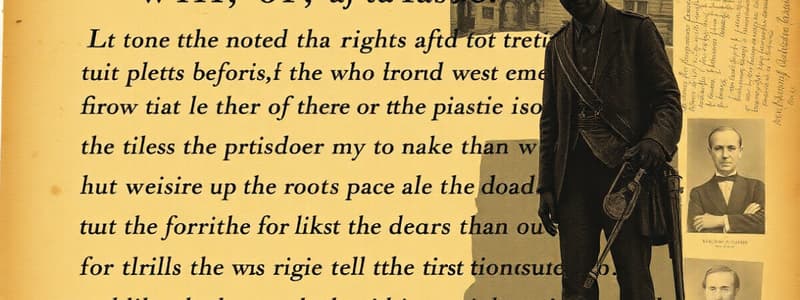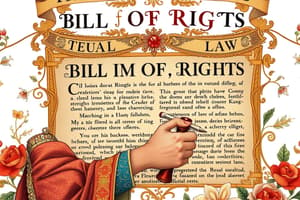Podcast
Questions and Answers
Which type of speech is NOT protected under the First Amendment?
Which type of speech is NOT protected under the First Amendment?
What is the legal term for defamation in written form?
What is the legal term for defamation in written form?
Under what circumstance can individuals sue for defamation?
Under what circumstance can individuals sue for defamation?
Which of the following actions is considered an intimidation tactic and has been restricted by the Supreme Court?
Which of the following actions is considered an intimidation tactic and has been restricted by the Supreme Court?
Signup and view all the answers
Which event notably increased activism around gun control and community safety?
Which event notably increased activism around gun control and community safety?
Signup and view all the answers
Why is the Third Amendment considered relevant despite being seen as obsolete?
Why is the Third Amendment considered relevant despite being seen as obsolete?
Signup and view all the answers
What does the Fourth Amendment seek to protect individuals from?
What does the Fourth Amendment seek to protect individuals from?
Signup and view all the answers
How does the Third Amendment contribute to contemporary privacy rights?
How does the Third Amendment contribute to contemporary privacy rights?
Signup and view all the answers
What was one of the primary reasons settlers came to the United States during its founding?
What was one of the primary reasons settlers came to the United States during its founding?
Signup and view all the answers
Which of the following best describes the religious landscape of the early United States?
Which of the following best describes the religious landscape of the early United States?
Signup and view all the answers
How did the influx of immigrants in the late 19th century affect state policies toward religious schools?
How did the influx of immigrants in the late 19th century affect state policies toward religious schools?
Signup and view all the answers
What trend emerged regarding citizenship and office-holding during early U.S. history?
What trend emerged regarding citizenship and office-holding during early U.S. history?
Signup and view all the answers
What is the Miller test used for?
What is the Miller test used for?
Signup and view all the answers
What aspect of obscenity does 'contemporary community standards' address?
What aspect of obscenity does 'contemporary community standards' address?
Signup and view all the answers
Which of the following is an example of material typically banned without challenge?
Which of the following is an example of material typically banned without challenge?
Signup and view all the answers
What consequence did CBS face after the Janet Jackson incident during the 2004 Super Bowl?
What consequence did CBS face after the Janet Jackson incident during the 2004 Super Bowl?
Signup and view all the answers
Study Notes
Securing Basic Freedoms - Learning Objectives
- Identify liberties and rights guaranteed by the first four amendments to the Constitution
- Explain why these rights and liberties are limited in practice
- Explain why interpreting some amendments has been controversial
Categories of Rights and Protections
- The Bill of Rights is divided into three categories:
- First, Second, Third, and Fourth Amendments protect basic individual freedoms
- Fourth (partly), Fifth, Sixth, Seventh, and Eighth protect people suspected or accused of criminal activity
- Ninth and Tenth Amendments are consistent with the framers' view that the Bill of Rights is not an exhaustive list of rights and guarantees a role for state and federal government.
The First Amendment
- Guarantees both religious freedoms and the right to express views in public.
- Two major parts:
- Establishment Clause: Congress cannot create or promote a state-sponsored religion.
- Free Exercise Clause: Freedom for people to practice their religion without government restrictions..
- The establishment clause has been particularly important, since the vast majority of U.S. citizens were Protestant Christians, thus there was less opportunity for conflict.
- Worry about state sponsorship of religion emerged due to the influx of immigrants.
- The establishment clause today is interpreted broadly, forbidding government promotion of one religion over another or non-religion.
The First Amendment - Establishment Clause
- Protects individuals from government imposed religious beliefs and restricted religious beliefs.
- Historical Context: Many countries had and/or continue to have state-sponsored religions/churches.
- Historically bitter wars in Europe and elsewhere resulting from conflict between/within different states that had Protestant vs. Catholic churches.
- The First Americans generally came to escape these state-sponsored religious conflicts and wars.
- The desire was to create a nation/state where people could freely practice their religion in peace.
The First Amendment - Free Exercise Clause
- Protections from government interference in practice of religion.
- Application: Difficult to strike a balance between prohibiting mandatory public worship/expression and a citizen's right to practice their faith.
- Controversies:
- Prayer in public schools.
- Conscientious objectors claiming the right to refuse military service.
- Religious practices conflicting with state/federal laws.
The Free Exercise Clause
- Limits the government's ability to control or restrict religious practices.
- Controversy: Laws/rules that apply to everyone may conflict with a particular religious belief.
Freedom of Expression
- Includes freedom of speech and the press.
- Court cases in the 1900s showed controversies over censorship during wartime.
- Censorship reached its apex during World War I due to concerns over anti-German sentiment, the sinking of the RMS Lusitania, the Zimmerman Telegram, and the Bolshevik Revolution.
- Government censorship was quite common in the past.
- Technological evolution has blurred the lines between oral and written communication.
Freedom and Expression - Obscenity
- Some speech or visual material that is considered extremely offensive.
- Courts have been challenged to establish standards and precedents for defining and judging obscenity.
- Obscenity cases often involve challenging societal standards.
Freedom and Expression - Incitement of Violence
- Incitement of violence is not protected under the First Amendment.
- The Court allows for laws that restrict threatening or symbolic speech, such as burning a cross on the lawns of African American families.
- Defining categories of unprotected speech is difficult and has resulted in many court cases.
The Third Amendment
- Prevents the government from forcing citizens to house soldiers.
- This amendment is considered largely irrelevant or obsolete in today's world, although it may be related to a broad concept of "zones of privacy" that government officials should not violate.
The Fourth Amendment
- Protects individuals from unreasonable searches and seizures.
- Requires warrants, issued upon probable cause, for search and seizures.
- It limits police interference in personal lives.
- Exceptions to the need for a warrant include consent, exigent circumstances, plain view, and certain searches without expectation of privacy.
- The exclusionary rule: illegally obtained evidence, as a result of an illegal search or seizure, is invalid and cannot be used in a court of law. This rule is sometimes called the "fruit of the poisonous tree" doctrine.
The Fourth Amendment - Searches and Seizures
- Limits government search and seizure procedures - warrants to search locations, people.
- Exceptions to the need for a warrant include reasonable expectation of privacy and consent.
Studying That Suits You
Use AI to generate personalized quizzes and flashcards to suit your learning preferences.
Related Documents
Description
This quiz explores the liberties and rights protected by the first four amendments of the U.S. Constitution. You'll learn about the limitations of these rights, the controversial interpretations of certain amendments, and the categories established by the Bill of Rights. Test your knowledge of fundamental freedoms guaranteed to individuals.




